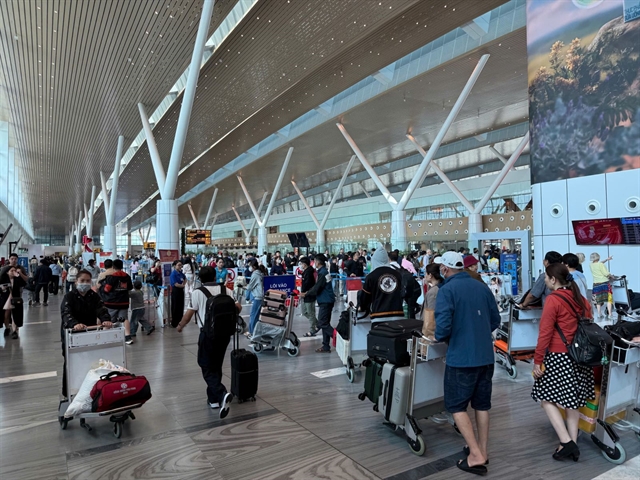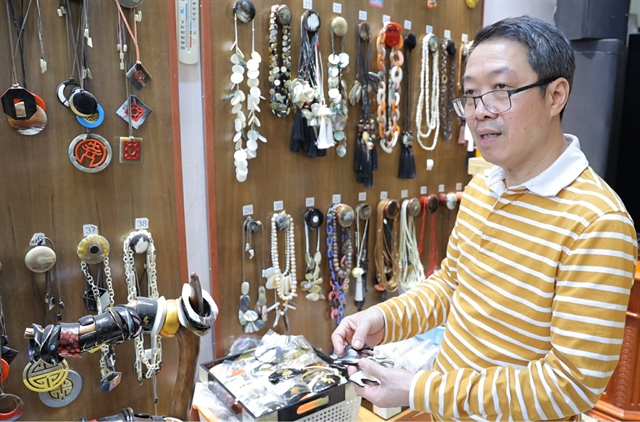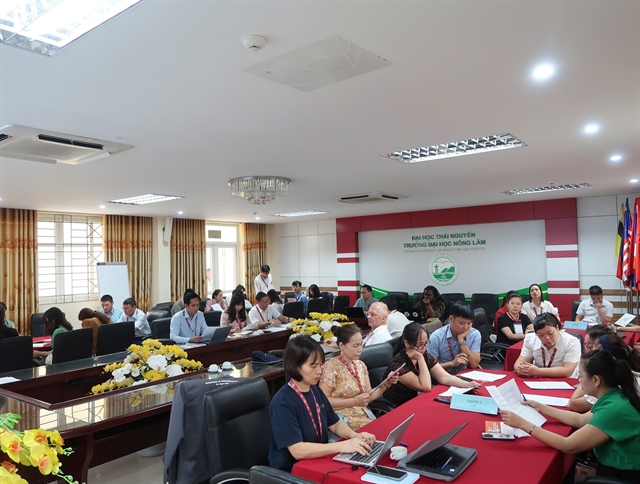 Society
Society


|
| A meeting to introduce Science programme titled Sustainable Animal and Aquatic Foods (SAAF) implemented in Thái Nguyên and Sơn La provinces. VNS Photo Tố Như |
THÁI NGUYÊN – A science programme for sustainable livestock development, strengthening disease safety and enhancing the value and competitiveness of products, has been launched in Thái Nguyên and Sơn La provinces.
The Sustainable Animal and Aquatic Foods (SAAF) programme has been launched by Consultative Group for International Agricultural Research (CGIAR) to support the building of healthier, more sustainable and more inclusive food systems from livestock and aquaculture.
The SAAF programme is being rolled out to overcome multiple challenges, such as low livestock productivity, complex disease outbreaks, increasing antimicrobial resistance, degradation of terrestrial and aquatic ecosystems and inefficient natural resource management.
SAAF expects to apply technical innovations to increase productivity and profitability while reducing emissions; improve the nutritional quality of food from livestock and aquaculture; strengthen resilience and improve health and livelihoods; and boost investment and budget allocations from stakeholders.
According to Nguyễn Quốc Huy, Deputy Director of the Thái Nguyên Sub-Department of Livestock, Veterinary and Fisheries, after the administrative merger Thái Nguyên Province has more than 135,000 cattle, nearly 888,500 pigs and 19.6 million poultry with 80 large-scale farms, 786 medium-sized farms and 753 small-scale farms.
Although the province has implemented many disease prevention measures, African swine fever is still spreading in 37 communes and wards in the northern part of the province, Huy said.
As of August 25, the disease had been reported in 74 communes and wards, with 16,196 pigs culled, he said.
“Smallholder, scattered farming still accounts for over 50 per cent, environmental protection measures remain limited and the proportion of farms applying VietGAP, biosecurity, disease safety standards and production based on value chain linkages remains low,” he said in a meeting on Monday co-organised by Thái Nguyên University of Agriculture and Forestry, the International Livestock Research Institute (ILRI) and the Alliance of Bioversity International and CIAT.
Thái Nguyên’s livestock sector aims to shift from household-based, scattered production to farm-based livestock systems, forming key livestock production zones, applying science and technology, fostering innovation and digital transformation.
At the same time, the province is also planning to scale up circular agriculture models adapted to climate change and low emissions.
During the meeting, participants discussed the current situation of livestock in Thái Nguyên, such as low productivity due to disease, feed and breed quality issues, poorly managed farming environments and weak value chain linkages.
SAAF’s objective is to build models that can serve as drivers for livestock development to become an important economic sector, aiming for modernisation, environmental sustainability, and production of safe, nutritious, high-quality branded, and market-competitive products.
The programme focuses on six areas of productivity, climate resilience, health, markets and policy, social inclusion, and digital solutions.
Dr Nguyễn Việt Hùng, ILRI Asia Regional Director, said: “One of the highlights of SAAF is its multi-stakeholder co-design approach, with expected results and activities built not only on scientific evidence but also adapted to local contexts and co-owned by the very communities who benefit.”
Hùng hoped Thái Nghuyên will become a pioneer province in applying and practising the One Health approach to disease prevention and control.
Dr Phan Thị Hồng Phúc, vice rector of Thái Nguyên University of Agriculture and Forestry, expressed the hope that the SAAF Programme will continue to expand its support scope, mobilise local resources and particularly focus on developing livestock value chains that create high-value, competitive products.
This will be a crucial pathway to improving farmers’ incomes, promoting sustainable socio-economic development, and affirming SAAF’s role as a long-term strategic partner in Thái Nguyên, she added. VNS